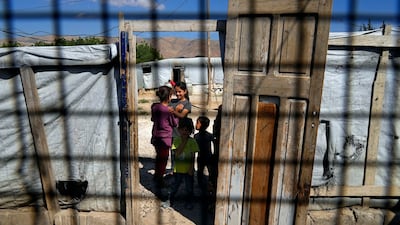Participants in the seventh Brussels donor conference on the future of Syria and the region described on Wednesday a country in which living conditions have become unbearable due to the lack of infrastructure.
Many Syrians living in government-controlled areas live with only two hours of electricity a day, which is not enough for water pumps to function, said Adham Moutaz, Syria country director for Oxfam.
Buying water from privately owned water companies costs €40 ($43) for a family of five in a country where average income is between €10 and €25 a month.
“One father told us: how can we teach our kids to maintain basic hygiene when for days or weeks sometimes, we don’t have water?” Mr Moutaz said. “They are living in fear at home when homes should be safe zones.”
Speakers called for more funding to respond to the country’s humanitarian crisis.
Pledges will be announced on Thursday after a meeting in Brussels of senior officials from the region including foreign affairs ministers from Jordan, Iraq and Lebanon.
“I call on the entire international community to generously pledge humanitarian support for people in Syria and the hosting communities in the region who literally need this more than ever,” said Janez Lenarcic, the EU commissioner for crisis management.
The two-day conference is aimed at gathering financial support for Syrians.
Infrastructure in Syria has been destroyed by 12 years of civil war, and neighbouring countries, which host 5.4 million Syrian refugees, are pushing for their return home despite fears for their safety expressed by the UN.
In total, more than 12 million Syrians have been forced to flee their homes, either within the country or abroad.
Fadi Al Dairi, country director UK-based NGO Hand in Hand for Aid and Development, called for more flexible and multiyear-funding from the international community.
“We recently moved some families from tents into dignified shelter,” he said. “The first thing kids did was touch the walls. They thought they felt weird. They were born and grew up in tents. That’s all they know.”
“Vulnerabilities are compounding,” said Nirvana Shwaky, regional director for the Mena region at international NGO Care international. The devastating February earthquake is merely one example of the “dire situation” in Syria, she said.
The International Committee of the Red Cross previously told The National that it is still seeking access to north-west Syria. The region was most affected by the earthquake but lies outside government control and remains an active war zone.
Local first responders complained after the earthquake that unlike in neighbouring Turkey, they received no international support to dig out victims from the rubble.
Andreas Papaconstantinou, director for neighbourhood and Middle East with the directorate general for European civil protection and humanitarian aid operations at the European Commission, said he “looked forward to substantial pledges” on Thursday.
“That is absolutely key.”
Last year, the Brussels conference raised $6.7 billion in aid for Syria and countries hosting refugees.
This year's conference will aim to raise $5.41 billion, according to the UN.


